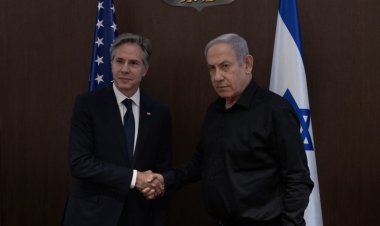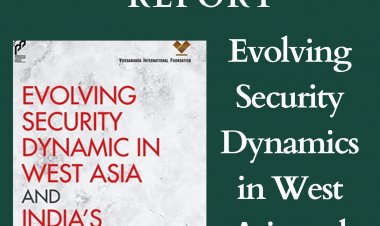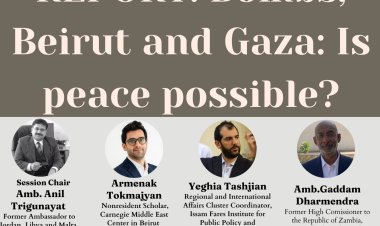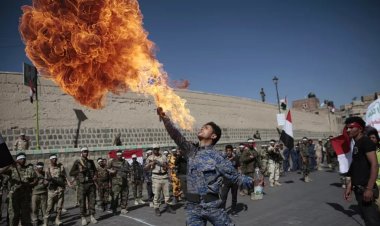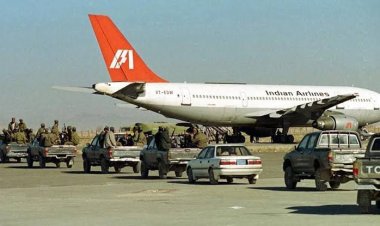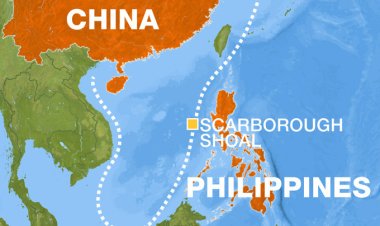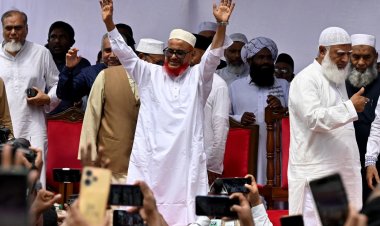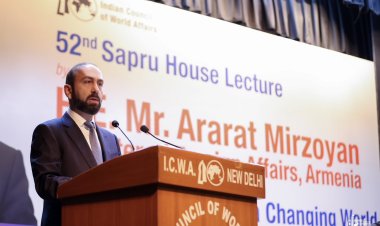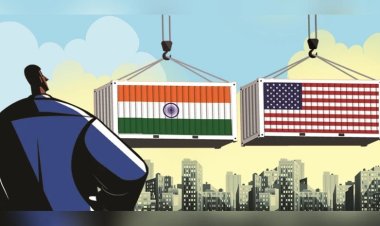Erdogan’s Caliphate Project and Jihadist Organizations: India Connection
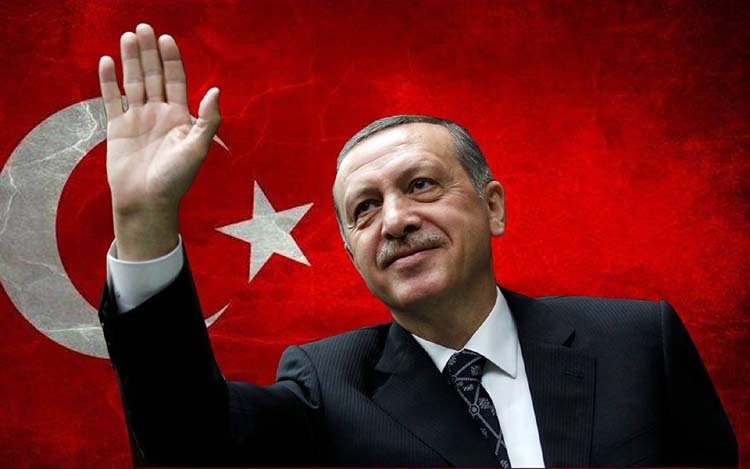
Event Report
Webinar No. 7
By Usanas Foundation
With the rising threat of Turkey for India inside the Indian territory and at international platforms, experts gathered under the aegis of Usanas Foundation to discuss emerging concerns on Erdogan’s mission of radicalising the world and its effect on India at the webinar titled “Erdogan’s Caliphate Project and Jihadist Organisations: India Connection”. The speakers at the event were CEO of Usanas Foundation Abhinav Pandya and Turkey expert and Sweden based investigative journalist Abdullah Bozkurt. The event was moderated by Bipindra NC.
Bozkurt began by highlighting that under Erdogan’s regime, Turkey is increasingly becoming isolated and insulated from across the world. Turkey has never been so alienated in the world till date. There is something very wrong with standard operating procedures as well as policy choices of the Erdogan government. When one sees the current policy decisions of Erdogan’s Government, it makes sense from the point of view of the personal interest of Erdogan and doesn't necessarily reflect the national interests of Turkey. Turkey’s interests have hardly mattered in policy decisions in the past few years.
Talking about the rise of state-sponsored extremism in Turkey, he recalled a huge gathering of the proscribed group Hizb Ut-Tahrir in 2015 in Ankara. They wanted to have a huge discussion on how to re-establish a Caliphate. People from all over the world, including from India, joined the gathering in large numbers. Though it has been designated as a terrorist organisation in Turkey, the gathering was a massive hit. The congregation declared to establish a Caliphate. It proved that Turkish laws did not matter to the political Islamists. The political Islamists are the ones who hijacked the election process, ballot boxes, and the entire election machinery. They have nothing to do with the democratic process and the idea of alternate governments.
In December 2016, a young guy assassinated a Russian diplomat in an art gallery. When an investigation was launched, it was found that it was a deliberate action to silence the diplomat. This guy was radicalised by several Islamist preachers. A number of them were working on the government payroll in Diyanet. All the connections led to senior government officials who were radicalised. Abu Basit Al-Hindi - a British Indian, was also connected to this incident. The assassin has been watching videos of this guy for radicalisation. He was watching his videos just a couple of days before the assassination.
There is a huge ideological motivation that thrives policy decision making in Turkey. Turning the Hagia Sophia museum into a mosque and the most recent decision of converting the Kariye Museum into a mosque are immensely important issues, personally for President Erdogan and the political Islamist - who constitute only 5% of the total population. There is a symbolism, there is an ideology, and there is a policy in all these decisions. The ramification is not limited only to Turkey. One can see its side effects all over the world, including in the Middle East, Africa, Asia, and even in the US. Erdogan has used groups like Hizb Ut-Tahrir, Jamaat-e-Islami, Muslim Brotherhood, etc. to further his agenda across the world. We need to be very concerned about it.
Erdogan staged a fake coup in July 2016 and used it to get rid of senior civil servants, judges, police chiefs, army generals - they were pushed out of the government services and most of them were jailed. At the same time, terrorists from Jihadi groups were released and hardly any criminal investigation is being carried out on them now. The system got afraid as they got the signals from political leadership not to dissent against the government.
Talking about the use of Turkey as a landscape by terrorists across the world, he said that the Turkish government has been providing logistical, diplomatic, and financial support to these groups across the world. Look at the traffic of terrorists to Turkey. Many prominent terrorist groups came to Turkey to expand organisations and later went back to their own country. This is how Turkey has acted as a breeding ground for outfits from all over the world.
Throwing light on the secular values amongst the general public of Turkey, he said that there is a general perception of secularism in Turkey as a part enshrined in the constitution. When Erdogan came to power, he had adversaries within his party. In the first two terms, he refrained from the open display of political Islam. However, during the third term, he sidelined adversaries, monopolised the power in the party, and completely shifted to political Islam. Any sort of radical Islamic groups were not allowed to practice until very recently in Turkey. Young girls were allowed to attend every event including classes, just by covering their heads. When the parties from the centre to left were in power, they led the country towards a critical situation, which is why people don't want to remember those times. Turkey moved from one extreme to another extreme in that sense. However, the current situation is more critical. Independent and critical media is gone. The judges protecting the constitution are not there. The two judges of constitutional courts were branded as terrorists and were punished. The protection of people is no longer there in Turkish society. People will soon realise that secularism is not a bad thing at all. Though it brought some miseries, it is still better than political Islam. But in general, the acceptance of secular values and ideas could be easily seen amongst Turkish people.
The opposition is fractioned and Erdogan is exploiting this. However, they are learning. In the last elections, they managed to take over Ankara and Istanbul by coming together. These mayoral positions, though symbolic, went to the opposition. My optimism for Turkey comes from two things. First, diversity in Turkish society. The society in Turkey is diverse. There is a certain threshold, burning point, but it shall rupture. The second reason for being optimistic is the finances of the economy. The Turkish government is majorly based on external countries for trade and economy and cannot afford to be isolated by the agenda of political Islam. So, I believe that Turkey shall certainly move towards normalcy very soon.
Erdogan primarily uses three methods for furthering his agenda: First, he capitalises on Salafi players. Turkey is predominantly a Sunni nation. By playing with Salafi players, you are radicalising your own population. It shall further become a national security threat to your own nation. These policies shall inflict self-harm to Turkey. Second, there are so many Muslim groups in neighbouring countries on whom Erdogan is banking to create proxies. Thirdly, Erdogan is working to radicalise countries like India, Bangladesh, Thailand, and even Europe. Preachers like Zakir Naik come to Turkey and have affiliation with radical NGOs endorsed by Erdogan. He doesn't engage on the front line, but with the proxies, with the NGOs propped up by Erdogan. When Zakir Naik came to Turkey, he worked with the IHH, the ‘humanitarian aid’ body of Turkey - an organisation listed by the United Nations Security Council for aiding and abetting ISIS in Syria. They have also been supplying arms and logistical support to terrorist outfits. IHH is an extension of Turkish intelligence.
Responding to a question on the Erdogan ruling over Turkey despite all odds, Bozkurt said that there are three major reasons behind this. First, it is the control over narrative in the public domain which is helping Erdogan to remain in power. Erdogan took over all the media and brought them under his control. From TV to newspapers, the entire media is under his control. In the guise of a fake coup, he shut down at least 200 media outlets. No independent and dissident media is left in Turkey, which is why Erdogan is successfully propagating his narrative. Consequently, the Turkish population is not getting real facts and issues. Second, in a country going through a financial crisis and numerous problems, people don't really feel the immediate effect of political Islam, therefore they don’t resist. They are unable to see the far-reaching consequences of this. Third, the crackdown on all the segments of the society and administration is massive. For example, 30% of the entire foreign service officials were pushed out from the Turkish Foreign Ministry on allegations of being indulged in terrorism. In the military, 70% of generals were pushed out. This severe crackdown on government institutions, civil society, educational institutions, etc. have made people afraid and they refrain from responding against the government.
On the question of the passiveness of NATO and other Western countries to counter Erdogan, Bozkurt opined that Realpolitik plays a role here. Erdogan is playing the card of refugees to make negotiations with European countries. Besides, he is also exploiting the fear that any instability in Turkey might have effects all over Europe. If the Turkish economy crumbles, it shall also have consequences on the entire Europe. This is how Erdogan blackmails Europe. All these can save Erdogan in the short run, but these policies are not at all sustainable.
Highlighting the scale and comprehensiveness of Erdogan’s propaganda across the world he cited the example of Erdogan’s propaganda army who put out fake stories in Afghanistan on Erdogan’s help to Rohingya Muslims - all these on a website made in the local language. His propaganda army has been extensively working to mobilise, fire up, and inspire radical Islamists in Afghanistan and Pakistan.
On the question of persecution of Uighurs in China, he argued that Turkey has a complex relationship with China. Due to the ongoing economic crisis, Erdogan had to turn towards China and had to keep himself silent on Uighur human rights issues in turn. Since 2011, we have seen how the Erdogan government has radicalised the Uighur community in Turkey. In 2014-15 Uighurs were on the top of the list of radicalised extremist groups. They moved in large numbers through Turkey to go to Syria and fight. With the support of Turkish intelligence, they were moving to Syria from China. In numerous cases, they moved to countries like Thailand and then moved to Turkey to go to Syria. Some of them also had Turkish passports. They were using the route of Turkey to pass to Syria. The Chinese government has been using the excuse of this radicalisation to persecute Uighurs. This shows a kind of hypocrisy in political Islam. Most of the time it's rhetoric and has no flesh. We see a double face of Erdogan in this issue.
On the effect of the Iranian Islamic Revolution on Turkey’s political Islam, he said that narrative is the key, the cultural element is extremely important, and Erdogan is using these cultural elements to promote his agenda. A similar thing was done during the Iranian Islamic Revolution. Most of the prominent personalities in the current Turkish government are inspired by this. They were young during the revolution and had participated in some way or the other. The head of the Turkish National Intelligence Organisation is very much influenced by the Iranian Islamic Revolution. The Chief Advisor of Erdogan is also a pro-Iranian guy. And there are numerous others sitting at top posts in the Turkish government who are inspired by the Revolution. They are looking up to Iran as a model. They also replicate the Iranian model in policy decisions. It is unprecedented. Iran has also been doing favours to acquaintances of Erdogan, which is why Erdogan has called Iran as his ‘second home’.
On the global ambitions of Turkey, Bozkurt highlighted that Erdogan mentions so many different countries during his speeches. He assumes that he has already become the Caliph. He sends the message of his leadership to all the Islamic countries. The narrative built by him connects to many communities. These communities, already going through crisis and sufferings, found a venue with Erdogan. We need to develop a mechanism to push back this. I don't see a lot of effort being spent on building a counter-narrative.
He was successful to some extent in Egypt, Libya, and dubbed everything in Syria to ensure that Bashar al-Assad gets toppled and a Muslim Brotherhood guy takes over. He has supported anybody and everybody in Syria who can fight Assad. A huge amount of Jihadist in Syria has ended up from Turkey. We are facing a non-state leadership in Turkey. He is making a number of proxy groups across the world, including NGOs, educational institutions, terrorist organisations, etc. and using them during the crisis to further his agenda. When it comes to Arab countries, the population really believes that they support Erdogan as they have fed up with their own leadership. Erdogan plans to mobilise them and take to streets to take over, whenever he wants.
On the popular support for Erdogan in Turkey, Bozkurt said that has opened the Pandora’s Box. The current situation is not a sustainable one as this has come at the cost of the institutions and media. However, after doing all the manipulations and curbing dissidents, he has managed only to secure 50% of votes. So the experience of Turkey as a republic over the past decades is going to come back. Erdogan doesn't have enough resources to fund his model. For example, in Libya, he is working with Qatari money. Turkey is only providing muscle, the army, but lacks resources. This is not a sustainable model at all. The damage he has already inflicted is going to be huge, not only for the Turkish population but for the entire Muslim community across the world. Somebody may be tried and promoted to replace Erdogan. Maybe not from Turkey, but from other countries. Turkish government runs schools in Afghanistan, Pakistan, Africa to radicalise them in the discipline of political Islam. They are young kids, studying in elementary schools. We need not give up and keep on fighting. Many people don't realise. Turkey is a different animal today. It is not the Turkey I grew in. If this continues to be so, it shall prove to be a bigger danger.
Abhinav Pandya began by talking about the historical connection of Turkey with Indian Muslims. When the Mamluk sultans (slave dynasty) came to India, it used to call itself Turkish, coming from the Eastern Turkistan area. When the Mughals came, they had Mongol and Turkish blood. The Mughal kings in India declared themselves as Caliphs. Akbar declared himself as the Caliph as well. The Khutba began to be read in the name of Mughal emperors. Then came the revolt of 1857, when a big chunk of Mughal nobility fled to Turkey to escape British persecution. British believed that Muslims were behind the perpetration of the revolt and started to be partial towards them, restricting them from government jobs and benefits. Later, William Hunter came up with the book ‘Indian Musalman’, in which he said that Hindus are becoming seditious, so you should start promoting Muslims to take on Hindus.
Mahatma Gandhi started supporting the Khilafat movement in 1919 - primarily to restore the Turkish Caliphate. Muslim community joined the movement as it was a rallying cause for Islam. But Gandhiji did not realise that it shall become a Frankenstein's monster. This whole thing left a whole set of political Islam amongst Muslim leaders and the Islamic society. The Mappila (Moplah) communal riots happened because of the sentiments generated from the same movement. It's not ISIS who first began to work for restoring the Caliphate. Mahatma Gandhi also did the same, though his intentions were different.
In the past few years, Erdogan has been working a lot on Indian Muslims. In Kashmir, he has emerged as a huge leader of the Muslim Ummah. TRT is doing a huge amount of biased coverage on Kashmir. The sophisticated content contributes to and adds legitimacy to Erdogan's propaganda. However, TRT has never spoken on terrorist organisations like LeT, Jamaat-e-Islami, Hizbul Mujahideen, killing hundreds of innocent people and minorities in Jammu and Kashmir.
He said that the separatist leaders of Kashmir celebrated Erdogan’s victory and hailed him. His last election victory was hailed all over India including Kerala, Western UP, Bihar, etc. If you approach the Muslims and exploit the weak nerve, you are likely to get the support. He is projecting the narratives that Muslims in India are facing genocide and going through an existential threat from the Hindu right-wing. The local political leaders and leftist intellectuals are aiding the narrative. Erdogan is projecting himself as a rallying force for the entire Muslim fraternity.
Turkey is giving a large number of scholarships and inviting the young generation of Kashmir to Turkey. In the last 3-4 years, a number of youngsters have preferred Turkey over SAARC nations or India itself for higher studies. This is one of the most prominent factors favouring Erdogan’s outreach amongst youth.
Abhinav argued that Erdogan is parallely working on three channels to further his agenda. In the first, he is rallying the support of radical Salafists. In the second way, he is garnering the support of Sufis and Barelvis, who generally do not have affection to political Islam, but love Erdogan. In the third, he is attracting youngsters by raising human rights issues, liberty, self-determination, etc. He is also using soft power like the Ertugrul Ghazi series, which is becoming very famous in Kashmir and people have started to name their kids on the names of characters of the series. They are also reaching out to Salafist preachers in India which include famous names like Salman Nadwi and Zakir Naik. Zakir Naik also spoke at TUGWA - an Islamist group managed by President Erdogan’s son, Bilal Erdogan. They are also making outreach in the political circles of India like the Popular Front of India (PFI) and Social Democratic Party of India (SDPI) - who believe in Maududi ideology.
He is also approaching prominent personalities of India. The recent meeting of Amir Khan with the First Lady of Turkey is an example. TRT Urdu has also come up with several propaganda materials for India. They are also actively using WhatsApp groups and trying to create a new Islamic identity in India. A new Muslim identity is being created by combining Muslims of India, Pakistan, Kashmir, and entire South Asia.
He further argued that the Saudi brand of Salafism doesn't strike with the people of South Asia, as historically there was no connection. With Turkey, there is a huge historical connection. Ertugrul Ghazi became a massive hit in India as well as in Pakistan due to the same reason. The areas where Turkey has made inroads were the most active areas during the Khilafat movement including Hyderabad, Lucknow, Kerala, etc. All these show that cultural ties are most important in connecting Indian Muslims with Turkey.
On the possible threat of Erdogan’s agenda for India, he said that the strategies of Erdogan can be very detrimental in terms of fallouts. On one hand, he projects himself as an Islamic leader. At the other, he is facilitating terrorism across the world including the promotion of Al Shabab, Boko Haran, ISIS, and what not? All those linkages can be used to promote terrorism in India. Islamic State-Khorasan Province (ISKP) has become a huge power in Afghanistan, which has been propped up as a proxy by Pakistan. Turkey is certainly going to have a deep footprint in Afghanistan with the withdrawal of US forces. Erdogan is then going to most likely promote Kashmir centric groups in terms of training, logistics, and finances. Turkey has also come up with impressive drone technology. If these drones end up at hands of terror groups, they can very well use them to bomb civilians and Indian security forces. These terrorist groups have strong sleeper cells all over India. Erdogan can use them further to foment a communal riot or terrorism in India. In the last few Muharram processions, Shia leaders were seen along with separatist leaders. In Kashmir, strong links of the Shia community have emerged with Hezbollah. Pakistan, in ISI’s Kashmir desk, has brought some Shia officers on board, who are working on the plan to radicalise Shias in Kashmir.
On the strategies of countering Turkish propaganda, he said that firstly, there is a lack of awareness. Second, Erdogan and Pakistan are masters of propaganda and raising proxies. We need to come up with our own strategy. We need to counter the ongoing propaganda and create our own counter-narrative.
The opinions expressed in the webinar belong to the panellists and not necessarily to the Usanas Foundation.


